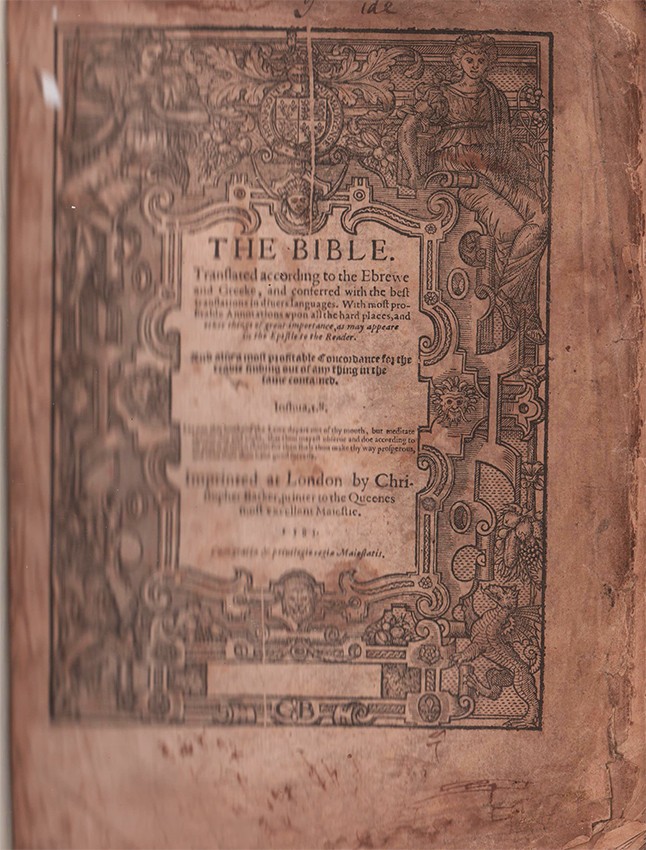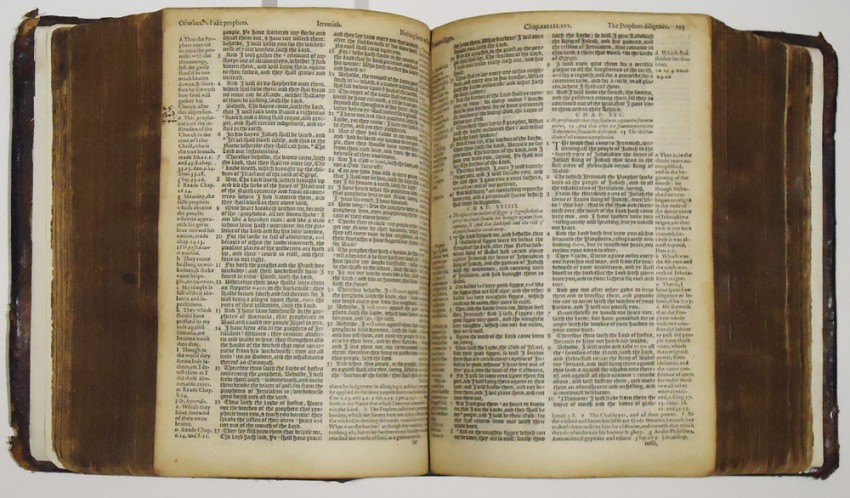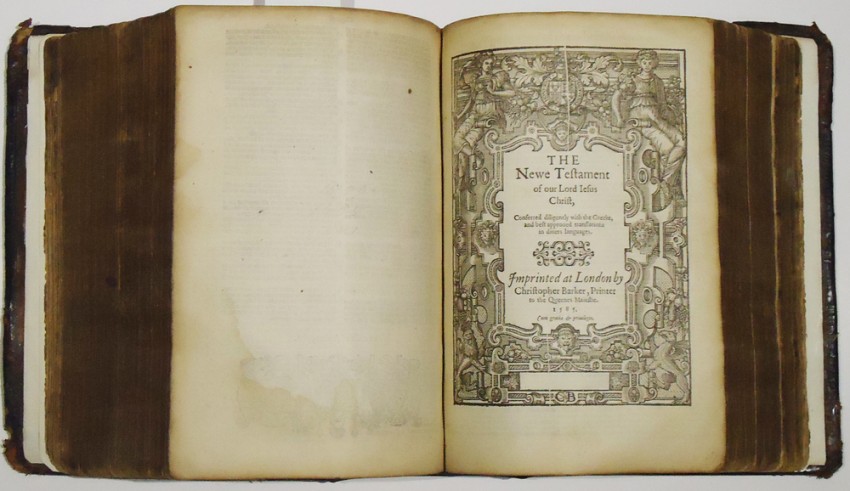With most profitable annotations among all the hard places, and other things of great importances as may appear in the Epistle to the Reader
Gothic script, lacks the first leaf - A i, full leather padded binding with blind tooling on the covers, recently rebacked, the leather is rubbed at the edges and chipped at the bottom corner on the front cover, the title label gilt on the spine is now faded, marginal notes throughout plus 4 pages of hand written notes on the back free end papers, the title pages are torn at the edges, bookplate on front paste down end paper, a good copy.
Contents: Book of Common Prayer [40 leaves] Old Testament leaves 41 -357; Apochrypha leaves 359 – 444; New Testament leaves 445 - 554; Two Concordances, Book of Psalms.
The University of Glasgow, from their Printing in England from William Caxton to Christopher Barker, An Exhibition: November 1976 - April 1977: An outstanding figure in the printing trade towards the end of the sixteenth century was Christopher Barker, a shrewd businessman who managed to acquire the most lucrative of all patents, namely the Bible patent. Born around 1529, Barker was a wealthy member of the Drapers' Company with powerful friends at court, for he was closely connected with the Walsingham family. He is thought to have been the grand nephew of Sir Christopher Barker, a former Garter King of Arms, which would explain his wealth, since the various properties of Sir Christopher ultimately passed into the possession of his nephew, Edward Barker, thought to have been the printer’s father.
Barker became interested in the printing trade and is first heard of as a publisher in 1569. In 1576 he started on his career as a Bible printer, having obtained a privilege to print the Geneva version of the Bible in England. In 1577 he purchased from Sir Thomas Wilkes, Clerk of the Privy Council, an extensive patent which included the Old and New Testament in English, with or without notes, of any translation. The full patent granted to Barker the office of royal printer of all statutes, books, bills, Acts of Parliament, proclamations, injunctions, Bibles, and New Testaments, in the English tongue of any translation, all service books to be used in churches, and all other volumes ordered to be printed by the Queen or Parliament. Barker's business continued to thrive and from 1588 onwards he conducted it mainly through his deputies, George Bishop and Ralph Newbery. On the disgrace of Wilkes in 1589, Barker managed to obtain a renewal of his exclusive patent with reversion for life to his son Robert.
Father and son lived in London at Bacon House in Noble Street, Aldersgate. Christopher Barker also had a house at Datchet, to which he retired after 1588, and there he died in 1599. He and his deputies had supplied the country with about seventy editions of the Scriptures between 1575 and 1599 and they were accurate and well printed. He was succeeded in the post of royal printer by his son Robert.
The Geneva Bible is one of the most historically significant translations of the Bible into English, preceding the King James Version by 51 years. It was the primary Bible of 16th-century English Protestantism and was used by William Shakespeare, Oliver Cromwell, John Knox, John Donne, and John Bunyan, author of The Pilgrim's Progress (1678). It was one of the Bibles taken to America on the Mayflower (Pilgrim Hall Museum has collected several Bibles of Mayflower passengers). The Geneva Bible was used by many English Dissenters, and it was still respected by Oliver Cromwell's soldiers at the time of the English Civil War, in the booklet "Cromwell's Soldiers' Pocket Bible".
This version of the Bible is significant because, for the very first time, a mechanically printed, mass-produced Bible was made available directly to the general public which came with a variety of scriptural study guides and aids (collectively called an apparatus), which included verse citations that allow the reader to cross-reference one verse with numerous relevant verses in the rest of the Bible, introductions to each book of the Bible that acted to summarize all of the material that each book would cover, maps, tables, woodcut illustrations and indices.
Because the language of the Geneva Bible was more forceful and vigorous, most readers strongly preferred this version to the Great Bible. In the words of Cleland Boyd McAfee, "it drove the Great Bible off the field by sheer power of excellence". https://en.wikipedia.org/wiki/Geneva_Bible
In the 1550's, the Church at Geneva, Switzerland, was very sympathetic to the reformer refugees and was one of only a few safe havens for a desperate people. Many of them met in Geneva, led by Myles Coverdale and John Foxe (publisher of the famous Foxe's Book of Martyrs, which is to this day the only exhaustive reference work on the persecution and martyrdom of Early Christians and Protestants from the first century up to the mid-16th century), as well as Thomas Sampson and William Whittingham. There, with the protection of the great theologian John Calvin (author of the most famous theological book ever published, Calvin's Institutes of the Christian Religion) and John Knox, the great Reformer of the Scottish Church, the Church of Geneva determined to produce a Bible that would educate their families while they continued in exile.
The New Testament was completed in 1557, and the complete Bible was first published in 1560. It became known as the Geneva Bible. Due to a passage in Genesis describing the clothing that God fashioned for Adam and Eve upon expulsion from the Garden of Eden as "Breeches" (an antiquated form of "Britches"), some people referred to the Geneva Bible as the Breeches Bible.
The Geneva Bible was the first Bible to add numbered verses to the chapters, so that referencing specific passages would be easier. Every chapter was also accompanied by extensive marginal notes and references so thorough and complete that the Geneva Bible is also considered the first English "Study Bible". William Shakespeare quotes hundreds of times in his plays from the Geneva translation of the Bible. The Geneva Bible became the Bible of choice for over 100 years of English speaking Christians. Between 1560 and 1644 at least 144 editions of this Bible were published. Examination of the 1611 King James Bible shows clearly that its translators were influenced much more by the Geneva Bible, than by any other source. The Geneva Bible itself retains over 90% of William Tyndale's original English translation. The Geneva in fact, remained more popular than the King James Version until decades after its original release in 1611! The Geneva holds the honor of being the first Bible taken to America, and the Bible of the Puritans and Pilgrims. It is truly the "Bible of the Protestant Reformation". Strangely, the famous Geneva Bible has been out-of-print since 1644, so the only way to obtain one is to either purchase an original printing of the Geneva Bible, or a less costly facsimile reproduction of the original 1560 Geneva Bible. http://greatsite.com/timeline-english-bible-history/index.html
Darlow T.H.) and Moule (H.F.) Historical catalogue of the printed editions of Holy Scriptures: page 100
- Overall Condition: A Good Copy
- Size: Thick 8vo (230 x 160 mm)
- Sold By: Clarke's Africana & Rare Books
- Contact Person: Paul Mills
- Country: South Africa
- Email: [email protected]
- Telephone: 021 794 0600
- Preferred Payment Methods: Visa & Mastercard via PayGate secure links and Bank transfers.
- Trade Associations: ABA - ILAB, SABDA


















